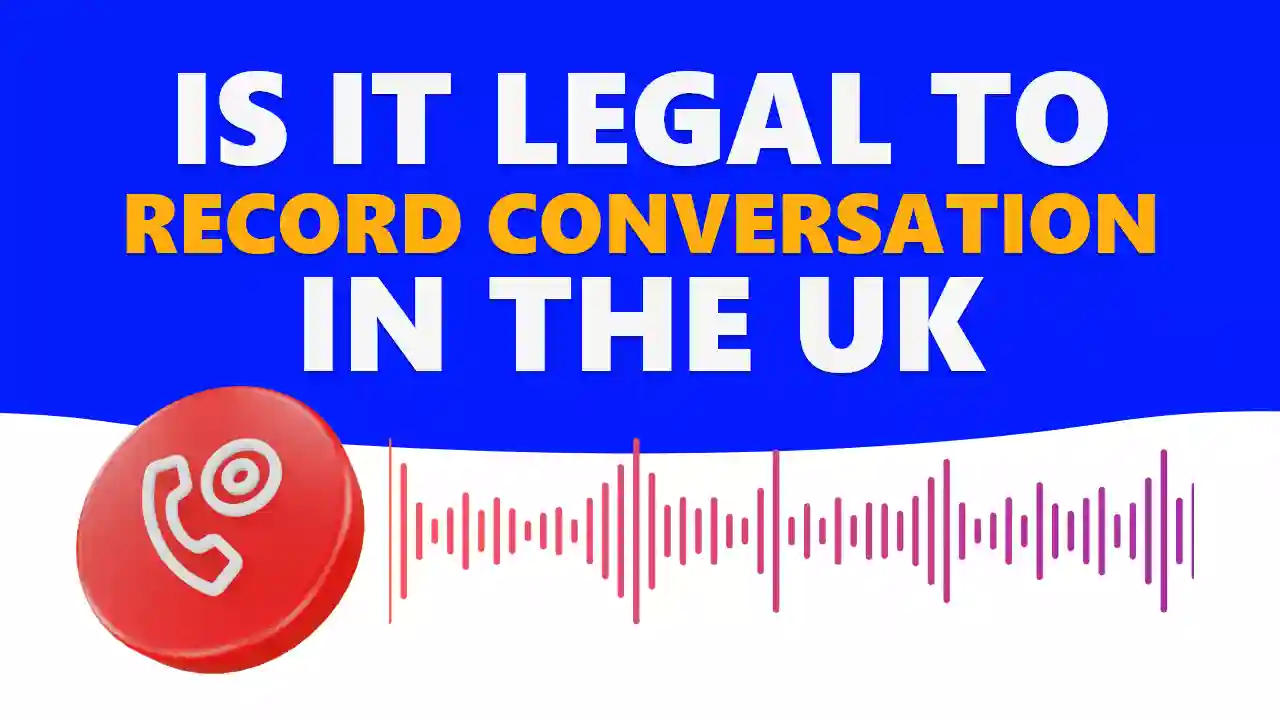People usually want to record phone calls conversations to help their memory or feel safer when there is a call from an unknown number. It is a common question that it is legal to record a conversation in UK? Yes, Recording a phone call conversation is legal in UK as long as it is for personal use.
However, to record a call, you must do it securely and safely by complying with the GDPR (General Data Protection Regulation) laws. The laws for call recording in the UK varies between individuals and businesses and it is essential to understand this difference to avoid any inconvenience.
Businesses must record phone calls for several purposes and be familiar with the GDPR laws. Here in this article, we will describe everything you need to know about GDPR to understand how to record calls ethically.
What Is GDPR?
GDPR is an acronym for General Data Protection Regulation, a set of privacy and security laws instituted by Europe. It came into effect in 2018, and this act is designed to impose regulations about how data is collected. Thus it is important to know how it can affect your business and its data collection and call recording policies.
According to the Regulation of Investigatory Powers Act 2000 (RIPA), individuals can tape conversations. However, legislation states that sharing this information with a third party violates this law, so GDPR was created to guide safe data sharing.
We can say that it is legal to record a call or collect data; it is illegal, however, to share this data with third parties without permission.
Is GDPR Still Applying to Call Recording After Brexit?
Yes, GDPR rules are still applied on call recordings even though the UK is set to leave the EU. Companies also need to comply with it if they continue their business with EU companies without being subject to fines.
It means no significant change occurs legally regarding call recordings despite Brexit. So how you record your business or individual phone calls conversations is still very important. Numerous standalone UK laws have similar clauses to GDPR to protect data privacy.
Since GDPR deals with individual privacy, it is intrinsically linked to two other pieces of UK legislation, which are:
- Data Protection Act 1998
- Human Rights Act 1998
Data Protection 1998 and the updated 2018 Act state that to record a business call where either party is identified, you have to inform the secondary party how the recorded information will be used, gain consent from the other party and keep data at a safe and accessible location.
What Is Meant By Ethical Call Recording?
Pieces of legislation such as GDPR are introduced to establish what ethical data recording should look like. The law states that call recordings must be kept private and only be obtained in the case of business or public interests. For any other type of call recording, it is crucial to get the other party’s consent before collecting data.
The current GDPR legislation consists of a comprehensive set of guidelines on sharing data, specifically when someone shares data in exchange for profit. However, it is a long document, so it is better to understand the key takeaways of the ethical calling. An ethical call recording is kept private and obtained only in case of public or business interest, such as using call recording as evidence to settle a dispute or building further intelligence about internal fraud.
On the other hand, non-ethical call recording has only the interest of a single party and includes tapping into a competitor’s phone system for your benefit. The UK law does not allow call interception as per the Interception of Communication Act 1985.
GDPR usually focuses on individual privacy but also covers employees’ privacy. As a business owner, you must be aware of how recording calls can breach the privacy of your internal parties. It is essential to notify relevant team members about your call recording policy. For example, if you have to record calls for quality or training purposes, mention them in the training material or employee handbook.
What Are GDPR's Laws For Individuals?
According to GDPR rules, recording personal calls in the UK is legal. The Regulation of Investigatory Powers Act (RIPA) is the main act that regulates call recordings. For individuals, there are no strict rules for recording a call as long as it is for personal use.
Recording a call is not an issue, but what you will do with this information matters. If you share this information with a third party without the permission of the person being recorded, this act becomes illegal.
Thus it is always essential to keep this information confidential so that no GDPR issue arises.
How Can you Comply With GDPR For Call Recording?
If you want to record phone calls while being compliant with GDPR, you must focus on the intended use of recorded data.
You can do it in the following ways:
1. Ask for Caller's Consent
The most important rule is to ask for the caller’s consent before recording. You can do it by notifying your customers every time that they are subject to being recorded.
In addition, if you have to share this information with third parties, such as your partners, you must inform your customer base first.
2. Conduct GDPR-Specific Call Recording
If you want to complete the call recording process legally, you must train your staff about the rules of GDPR. They also have to be compliant, which means implementing these guidelines to prevent common in-office mistakes such as leaving confidential information lying around, repeating sensitive information aloud over the phone or skipping disclaimers about call recording.
3. Store Data Securely
Now that you know sharing recorded data is not recommended, storing your customers’ data securely is crucial to prevent data theft. Because if someone steals your data, you may lose your reputation and face legal issues.
How To Record Your Business Phone Calls?
The GDPR rules regarding business and individual phone calls differ, so you must be aware of how to record business calls to ensure compliance.
According to Telecommunication Regulations 2000, businesses are allowed to record calls without consent for any of the following purposes:
- Call recording as evidence of business exchange.
- Reviewing the quality standards
- Check business compliance with regulations
- Prevention or detection of criminal activities
- Investigation of any suspicious activity
Suppose you are recording calls for any of the above reasons. In that case, it is a good idea to register with the Information Commissioner’s Office (ICO) to state that your business will securely keep customers’ personal information.
Although you are not legally bound to tell your customers about call recording, it is a good practice to put an automated disclaimer in place.
According to GDPR rules, you must document how you will process your customer’s data if you need to record your business calls.
Switch To VoIP And Enjoy Easy Call Recording
Conclusion - Call Recording is Legal or Not
Recording a conversation in the UK without the caller’s consent is illegal. However, individuals can tape conversations for personal use, as stated in the Regulation of Investigatory Powers Act 2000 (RIPA). GDPR laws must be followed when recording calls to ensure data privacy and security. GDPR applies to call recordings even after Brexit.
Ethical call recording involves keeping the recording private and obtaining consent from the other party before collecting data.
GDPR laws require individuals to inform the secondary party how the recorded information will be used, gain consent from the other party, and keep data at a safe and accessible location.
Businesses must focus on the intended use of recorded data, ask for caller consent, conduct GDPR-specific call recording, and store data securely.




